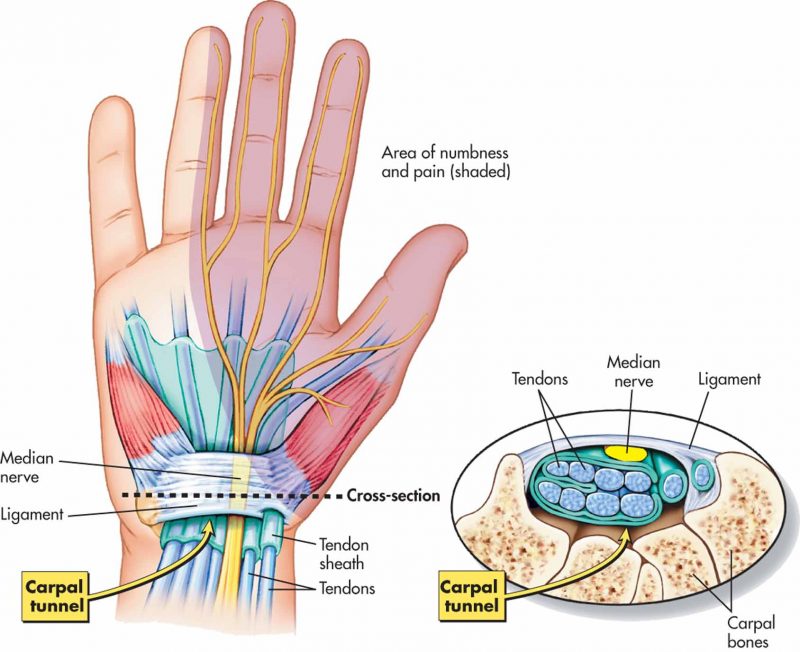Do you experience numbness, pains or pins and needles in your hand?
Does this wake you up at night?
Do you feel your fingers are clumsy and you drop objects?
Then you may have Carpal Tunnel Syndrome.
CARPAL TUNNEL SYNDROME
WHAT IS IT?
Carpal tunnel syndrome is caused by too much pressure on the median nerve, which is one of the main nerves in the hand. The problem occurs in a narrow tunnel in the wrist called the carpal tunnel. The bones of the wrist (carpals) make up the floor of the tunnel and a thick ligament, called the transverse carpal ligament, make up the top of the tunnel. The median nerve runs through the carpal tunnel as well as the flexor tendons that bend your fingers. The median nerve gives feeling to the thumb, forefinger, middle finger and half of the ring finger and also supplies the muscles of the thumb.
SYMPTOMS
Pressure on the median nerve can cause one or more of the following symptoms:
- Numbness
- Pins and needles
- Pain, particularly at night
- Darting pains from the wrist
- Swelling
- Weakness
- Clumsiness
These symptoms occur in the thumb, index, middle and ring fingers and the palm. Early on, symptoms usually occur during the sleeping hours. In more advanced cases, symptoms occur during waking hours.
WHAT CAUSES IT?
Anything that causes increased pressure or irritation to the nerve in the tunnel can lead to carpal tunnel syndrome. Common causes include:
- Swelling about the tendons in the tunnel from strenuous or repetitive gripping
- Holding the wrist in a bent position for long periods of time
- Holding small objects for long periods of time
- Swelling from conditions such as arthritis or pregnancy
- Changes in the size of the tunnel, such as in a fractured wrist
- Resting wrist against hard objects for prolonged periods, such as on a desk while using a keyboard
TREATMENT
You cannot “work through” carpal tunnel syndrome and if left untreated it can lead to permanent damage to your hand. Carpal tunnel syndrome can be managed simply and effectively with non-surgical treatment in a large number of people. A qualified therapist will complete a thorough assessment of your symptoms and tailor a treatment plan to your needs. This plan will often include a custom splint for night time to rest the median nerve and specific daily exercises to help the nerve and flexor tendons glide through the carpal tunnel. Most people have a significant reduction in symptoms within a few days with the nerve irritation resolved in only 4-6 weeks.
Occasionally for some people the median nerve is so severely compressed that their symptoms will not resolve with therapist treatment. These people will need to have surgery to decompress the nerve and therapy is required post surgery for scar management, hypersensitivity and reduced range of motion and strength.
If you are experiencing any of the symptoms of Carpal Tunnel Syndrome book in with Marnie, our hand therapy specialist at Osteohealth, for an assessment and tailored treatment plan on 02 6021 2777 or online bookings are available at https://osteohealth1.cliniko.com/bookings#service
